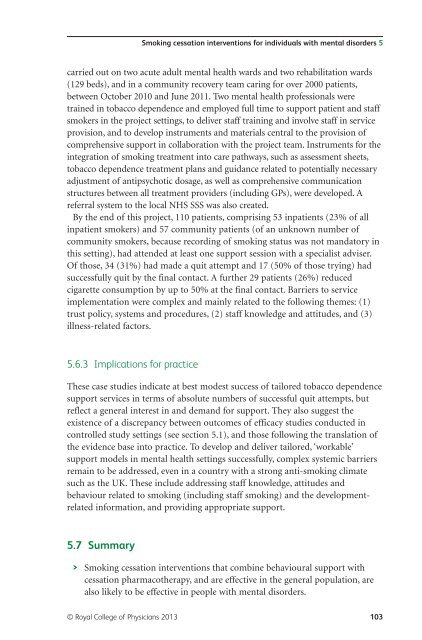Smoking and mental health - NCSCT
Smoking and mental health - NCSCT
Smoking and mental health - NCSCT
Create successful ePaper yourself
Turn your PDF publications into a flip-book with our unique Google optimized e-Paper software.
<strong>Smoking</strong> cessation interventions for individuals with <strong>mental</strong> disorders 5<br />
carried out on two acute adult <strong>mental</strong> <strong>health</strong> wards <strong>and</strong> two rehabilitation wards<br />
(129 beds), <strong>and</strong> in a community recovery team caring for over 2000 patients,<br />
between October 2010 <strong>and</strong> June 2011. Two <strong>mental</strong> <strong>health</strong> professionals were<br />
trained in tobacco dependence <strong>and</strong> employed full time to support patient <strong>and</strong> staff<br />
smokers in the project settings, to deliver staff training <strong>and</strong> involve staff in service<br />
provision, <strong>and</strong> to develop instruments <strong>and</strong> materials central to the provision of<br />
comprehensive support in collaboration with the project team. Instruments for the<br />
integration of smoking treatment into care pathways, such as assessment sheets,<br />
tobacco dependence treatment plans <strong>and</strong> guidance related to potentially necessary<br />
adjustment of antipsychotic dosage, as well as comprehensive communication<br />
structures between all treatment providers (including GPs), were developed. A<br />
referral system to the local NHS SSS was also created.<br />
By the end of this project, 110 patients, comprising 53 inpatients (23% of all<br />
inpatient smokers) <strong>and</strong> 57 community patients (of an unknown number of<br />
community smokers, because recording of smoking status was not m<strong>and</strong>atory in<br />
this setting), had attended at least one support session with a specialist adviser.<br />
Of those, 34 (31%) had made a quit attempt <strong>and</strong> 17 (50% of those trying) had<br />
successfully quit by the final contact. A further 29 patients (26%) reduced<br />
cigarette consumption by up to 50% at the final contact. Barriers to service<br />
implementation were complex <strong>and</strong> mainly related to the following themes: (1)<br />
trust policy, systems <strong>and</strong> procedures, (2) staff knowledge <strong>and</strong> attitudes, <strong>and</strong> (3)<br />
illness-related factors.<br />
5.6.3 Implications for practice<br />
These case studies indicate at best modest success of tailored tobacco dependence<br />
support services in terms of absolute numbers of successful quit attempts, but<br />
reflect a general interest in <strong>and</strong> dem<strong>and</strong> for support. They also suggest the<br />
existence of a discrepancy between outcomes of efficacy studies conducted in<br />
controlled study settings (see section 5.1), <strong>and</strong> those following the translation of<br />
the evidence base into practice. To develop <strong>and</strong> deliver tailored, ‘workable’<br />
support models in <strong>mental</strong> <strong>health</strong> settings successfully, complex systemic barriers<br />
remain to be addressed, even in a country with a strong anti-smoking climate<br />
such as the UK. These include addressing staff knowledge, attitudes <strong>and</strong><br />
behaviour related to smoking (including staff smoking) <strong>and</strong> the developmentrelated<br />
information, <strong>and</strong> providing appropriate support.<br />
5.7 Summary<br />
> <strong>Smoking</strong> cessation interventions that combine behavioural support with<br />
cessation pharmacotherapy, <strong>and</strong> are effective in the general population, are<br />
also likely to be effective in people with <strong>mental</strong> disorders.<br />
© Royal College of Physicians 2013 103














